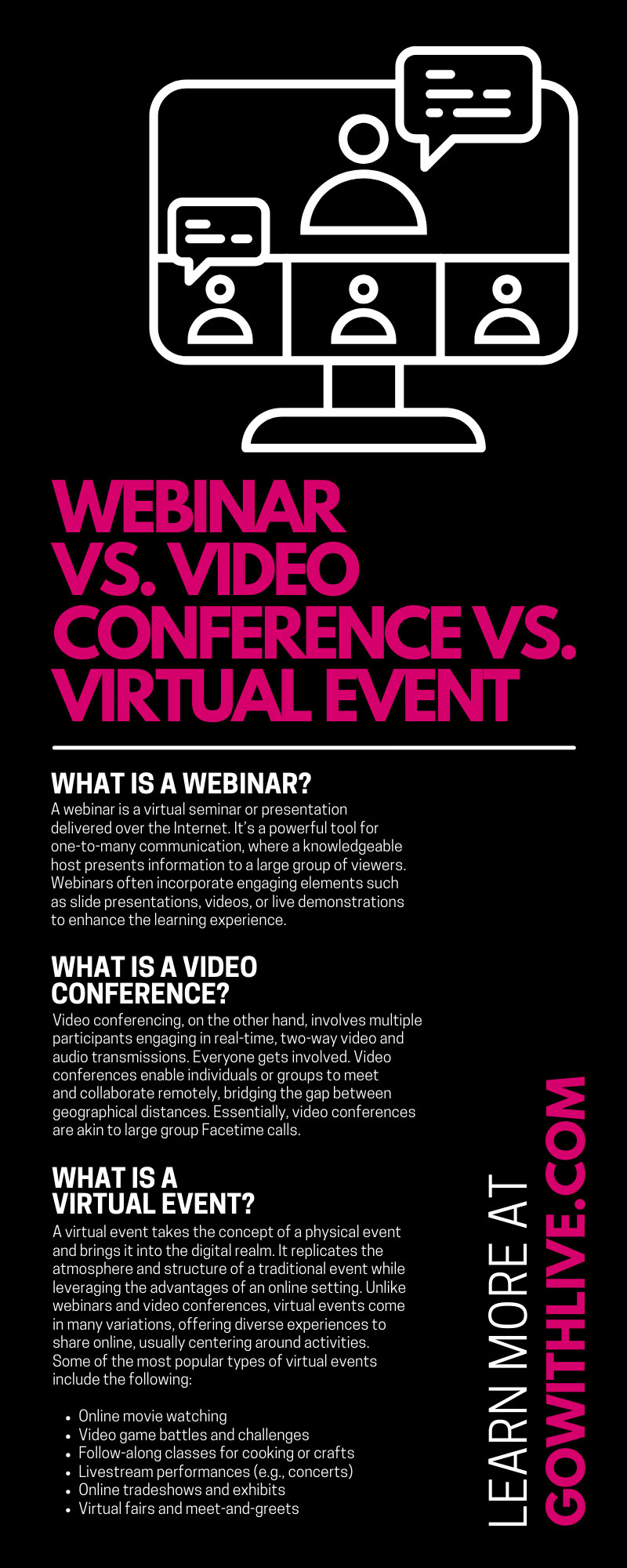
Webinar vs. Video Conference vs. Virtual Event
Online communication and technology have revolutionized the way we connect, interact, and share information. In recent years, communication technology has also reshaped online shared experiences. The most prominent digital experiences that have gained popularity are webinars, video conferences, and virtual events. All three of these online occurrences provide varying encounters and advantages that can enhance your business in a myriad ways. However, despite these events’ differences, many people confuse the three and refer to them interchangeably. Discover the differences between a webinar versus a video conference versus a virtual event to determine which can best serve your business and needs.
What Is a Webinar?
A webinar is a virtual seminar or presentation delivered over the Internet. It’s a powerful tool for one-to-many communication, where a knowledgeable host presents information to a large group of viewers. Webinars often incorporate engaging elements such as slide presentations, videos, or live demonstrations to enhance the learning experience.
During a webinar, the host leads, performs, and controls the entire event with little to no actual interactions with the guests. In most webinars, you only see the host of the event and their presentation. Others in the online room remain hidden.
Webinars have gained popularity in various domains, including education, product demonstrations, and company announcements, thanks to their ability to effectively convey information to a wide audience.
What Is a Video Conference?
Video conferencing, on the other hand, involves multiple participants engaging in real-time, two-way video and audio transmissions. Everyone gets involved. Video conferences enable individuals or groups to meet and collaborate remotely, bridging the gap between geographical distances. Essentially, video conferences are akin to large group Facetime calls.
The main purpose of a video conference is communication and networking—it’s an opportunity for people to talk and meet. Most video conferences focus on a particular agenda, whether that’s conversing about a certain topic or discussing upcoming projects. Video conferences are the virtual equivalent of boardroom meetings.
Video conferences are widely popular for business meetings, project collaborations, and even social gatherings, as they provide a virtual space for face-to-face interactions and seamless communication.
What Is a Virtual Event?
A virtual event takes the concept of a physical event and brings it into the digital realm. It replicates the atmosphere and structure of a traditional event while leveraging the advantages of an online setting. Unlike webinars and video conferences, virtual events come in many variations, offering diverse experiences to share online, usually centering around activities. Some of the most popular types of virtual events include the following:
- Online movie watching
- Video game battles and challenges
- Follow-along classes for cooking or crafts
- Livestream performances (e.g., concerts)
- Online tradeshows and exhibits
- Virtual fairs and meet-and-greets
- Conferences, sales meeting and product introductions
Virtual events can even include webinars and conferences as part of their experience; in this way, virtual conferences and virtual events can fall under the same umbrella.
Virtual events can range in scale, incorporating various digital tools and technologies to create an immersive user experience for all involved. In a virtual event, everyone can participate in some shape or form. Depending on the event, virtual event guests can passively interact, sticking to a viewer and audience role, or they can actively engage, making decisions, creating, or communicating. Virtual events allow people to share all kinds of experiences together without having to be physically close or even in the same state or country.
Key Differences
While these three online experiences may seem similar at first glance, they serve different purposes and cater to distinct needs. Webinars are primarily useful for one-way communication, focusing on delivering information effectively to a large audience. Video conferences, on the other hand, emphasize two-way interaction and collaboration, enabling participants to actively engage in discussions and contribute ideas. Finally, virtual events go beyond communication and interaction, aiming to recreate the comprehensive experience of physical events in a digital environment, complete with networking opportunities, immersive activities, and engaging content.
Choosing the Right One for You
When deciding between a webinar, video conference, or virtual event, consider your objectives and the level of engagement you seek. What type of experience do you want to offer and create?
Choosing a Webinar
If your goal is to share information with a large audience without extensive interaction, a webinar can be the ideal choice. You can host webinars on many different platforms and don’t necessarily need fancy technological components—just a camera and an online streaming program, such as Zoom, Vimeo or YouTube. You can also prerecord webinars so guests can attend at any time, which could increase viewership by accommodating everyone’s schedules.
Choosing a Video Conference
If you want to facilitate a collaborative meeting or discussion, video conferencing would be the way to go, allowing for real-time interactions and brainstorming sessions. Like webinars, video conferences require very few additional technical components other than a virtual online space and communication means.
Choosing a Virtual Event
If you are looking for an immersive experience that can house various activities, interactions, and networking opportunities, a virtual event would be the most suitable choice. Virtual events enable the recreation of the atmosphere and dynamics of a physical event—but in a digital setting. These online occurrences are great for the following purposes:
- Team bonding
- Annual meetings or conferences
- Networking
- Business promotion
Virtual events allow you to pass on a message in an engaging and memorable way. Depending on the type of event you create, virtual events do require a few more components than webinars and video conferences, but virtual event professionals can help. L!VE virtual event planners can work with you to plan and execute a successful virtual event, taking care of all the details. No matter the platform, occasion, or tech, our team can create memorable, meaningful, fun virtual events that mirror the joys and successes of a large in-person gatherings.
Understanding the nuances and capabilities of webinars versus video conferences versus virtual events empowers you to choose the most appropriate platform for your specific needs. The right kind of virtual encounter can enhance your business in many ways, influencing the information you share with your team, your employees’ wellness, and general opportunities. Webinars, video conferences, and virtual events are modern ways to communicate, collaborate, and engage in the digital realm.
